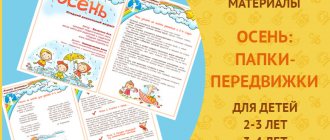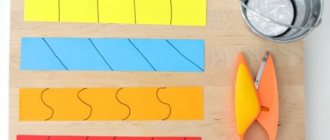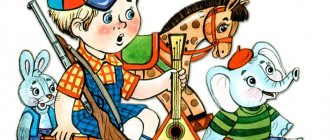Consultation for parents. "Mathematical preparation for school"
Consultation for parents.
"Mathematical preparation for school"
One of the most difficult subjects in school is mathematics.
As psychological and pedagogical research has shown, children 6-7 years old are not always ready to master a mathematics course in accordance with the general education school curriculum. In this regard, one of the tasks of both parents and teachers is to identify the child’s basic mathematical knowledge and prepare him for studying a mathematics course at school.
By the beginning of school, children acquire basic mathematical knowledge through games and everyday life situations. Many of them attended preschool for some time. The education and training program in kindergarten provides for the development of elementary mathematical concepts. In accordance with this program, children should know:
1. The composition of the numbers of the first ten (from individual units) and the composition of the numbers of the first heel from two smaller ones.
2. How to get each number of the first ten by adding one to the previous one and subtracting one from the next one in the series.
3. Numbers from 0 to 10; signs +, -, =; Coins in denominations of 1, 5, 10 kopecks.
4. The name of the current month, as well as the sequence of days of the week.
Be able to:
1. Name numbers in forward and reverse order.
2. Correlate the number and number of items.
3. Compose and solve one-step problems involving addition and subtraction, use arithmetic action signs.
4. Measure the length of objects using a conventional measure.
5. Compose larger figures from several triangles and quadrangles.
6. Divide a circle or square into two and four equal parts.
7. Focus on a piece of paper.
8. Count (count out) objects within 10-20.
9. Use ordinal numbers to determine the total number of objects and the place of a particular object in a row.
10. Make a number from units (within 10)
11. Compose from two smaller numbers and decompose into two smaller numbers (within 10).
At the same time, it is natural that children have different opportunities, different preparation, and the goals that the family sets when deciding which school to enroll the child in are also different. However, regardless of these factors, by the age of 6-7 years a child should know and be able to do a lot.
If the child has not attended kindergarten or any other group classes, his parents should help him gain the necessary knowledge and skills by studying with him at home. Of course, we are not talking about any special training that precedes school education. We mean such preparatory activities with a child that lay the foundation for the success of his education at school.
When starting to work with your child, remember that working together with you should bring him joy. Show maximum tact, kindness, and patience. It is important to instill in the child confidence in his abilities, confidence in the ability to complete any task.
From the very beginning of work, prevent mistakes, explain the instructions or rules of the game in detail to your child, and monitor the progress of their implementation. If the child does not understand the task, start working together, gradually reducing the share of your participation in joint work and play.
We recommend that parents make extensive use of toys, objects from the environment, a variety of teaching materials, and pictures. It is better to conduct all classes in a playful way.
However, don’t limit your activities to just playing. The child must understand that learning is work. To get the job done, you have to restrain your desires and do something completely different from what you want at the moment.
The tasks that we offer you are used in practical work with children in preparing them for school, and, as a rule, they are not new.
The material is grouped in such a way that parents can check their child’s readiness to successfully learn mathematics at school, know which tasks and to what extent are feasible for a child of this age, and how to develop the necessary skills.
How best to do this depends largely on your desire and ingenuity. Using our recommendations, you yourself can come up with tasks similar to those proposed, especially if the child has difficulty completing them.
PREPARING A CHILD TO LEARN MATHEMATICS
To successfully learn mathematics, a child must have a concept of magnitude, formed spatial and quantitative concepts, master forward and backward counting, counting concrete and abstract objects, know numbers, numbers and be able to relate them to quantities, know geometric figures.
When entering school, a child must be able to solve arithmetic problems. Problems occupy a significant place in elementary school mathematics courses. Almost half of the time in mathematics lessons is spent solving problems.
Arithmetic problems help to reveal the basic meaning of arithmetic operations and connect them with a specific life situation. Problems contribute to the assimilation of mathematical concepts, relationships, and patterns. As a rule, each plot task reflects a certain life situation. Thus, in elementary school there are many arithmetic problems, the content of which mentions various professions. For example: “The carpenter made..., the gardener grew or processed...” It is important that children have a fairly complete understanding of professions.
An important role in preparing a child for school is played by the formation of spatial and quantitative concepts (more - less, many - few, etc.). Difficulties in solving problems may be associated with insufficient understanding of the situation reflected in the problem, with the difficulty of identifying the main idea, question, mathematical connections and relationships between numerical data. And, of course, solving problems is impossible without knowing the composition of the number.
Our task and the task of parents is to help the child, even before school, learn to navigate the issues mentioned above, to prepare him for the perception of the school curriculum. Taking this into account, our further presentation is structured.
In order for a child to avoid difficulties associated with studying mathematics and solving arithmetic problems, care must be taken to expand his general horizons.
The exercises, tasks and games in the “Mathematics” section are aimed at broadening the child’s horizons specifically in the field of mathematical knowledge and concepts.
Get text
Consultation for parents on FEMP in the middle group
Content
Consultation for parents “The role of didactic games in the process of FEMP in preschool children.”
The concept of “formation of mathematical abilities” is quite complex and complex. It consists of interrelated and interdependent ideas about space, shape, size, time, quantity, which are necessary for the cognitive development of the child.
The formation of mathematical concepts in children is facilitated by the use of a variety of didactic games. Didactic games are games in which cognitive activity is combined with gaming activity. On the one hand, a didactic game is one of the forms of an adult’s educational influence on a child, and on the other hand, a game is the main type of independent activity of children. And independent play activities are carried out only if children show interest in the game, its rules and actions.
A didactic game is a complex phenomenon, but its structure is clearly visible. One of the elements of the game is a didactic task, which is determined by the purpose of the teaching and educational action. The second element is content. The success of the game lies in its effectiveness, so preparing for the game is about clarifying your existing baggage and skills or developing them. The third element of the game is the rules. They determine the nature and method of play actions, organize and direct the behavior of children. The fourth element is game actions, actions that each participant in the game performs to achieve a result. They activate interest in the didactic game. The fifth element is the result. An indicator of the level of achievement of children in mastering knowledge, and the development of mental activity and relationships.
What is the significance of the game? In the process of playing, children develop the habit of concentrating, thinking independently, developing attention, and the desire for knowledge. Being carried away, children do not notice that they are learning, experiencing, remembering new things, navigating in unusual situations, replenishing their stock of ideas and concepts, and developing their imagination. For preschool children, play is of exceptional importance: play for them is study, play for them is work, and play for them is a serious form of education. Play for preschoolers is a way of learning about the world around them. Unlike other activities, play contains a goal in itself; The child does not set or solve extraneous and separate tasks in the game. However, if for the pupil the goal is the game itself, then for the adult who organizes the game there is another goal - the development of children, their acquisition of certain knowledge, the formation of skills, the development of certain personality qualities.
The didactic game only partly meets the requirements of a complete systematic knowledge: sometimes it is an “explosion of surprise” for children from the perception of something new, unknown; sometimes the game is “search and discovery”, and always the game is joy, children’s path to their dreams. Filling learning with emotional and cognitive content is a feature of the didactic game.
When using didactic games, various objects and visual material are widely used, which helps ensure that classes are held in a fun, entertaining and accessible way. To form elementary mathematical concepts in preschoolers, the following types of didactic games are used:
1. Games with objects: “Assemble a pyramid”, “Assemble a matryoshka doll”, “Build a turret”, etc. The purpose of these games is to help consolidate the qualities of objects (size, shape, color).
2. Games for sensory development:
- to fix the color of an object: “Multi-colored beads”, “Put a bouquet in a vase”, “Let’s treat the bear with a berry”, etc. By playing these games, children learn to group and correlate objects by color.
- to fix the shape of an object: “What shape is this? ”, “Circle, Square”, “Patches for the rug”, “Mand your pants”, etc. In these games, children learn to distinguish, group objects by shape, and insert objects of a given shape into the holes corresponding to them.
- to consolidate the size of an object: “Big and small”, “Which ball is bigger”, “Let’s treat the bear”, etc. These games teach children to distinguish, alternate, and group objects by size.
3. Games with bottle caps: “Balloons”, “Sunny Glade”, “Pick wheels for a car”, etc. These games teach children to distinguish, group, alternate objects by color and size.
It is important to note that each game provides exercises useful for the mental development of children and their education. Thanks to games, it is possible to concentrate the attention and attract the interest of even the most disorganized preschool children. At the beginning, they are captivated only by game actions, and then by what this or that game teaches. Gradually, children awaken interest in the subject of study itself.
The role of didactic games in the formation of elementary mathematical concepts in younger preschoolers is very great. They help the child learn how the world around him works and broaden his horizons.
View the contents of the document “Consultation for parents on FEMP in the middle group”
Consultation for parents “The role of didactic games in the process of FEMP in preschool children.”
The concept of “formation of mathematical abilities” is quite complex and complex. It consists of interrelated and interdependent ideas about space, shape, size, time, quantity, which are necessary for the cognitive development of the child.
The formation of mathematical concepts in children is facilitated by the use of a variety of didactic games. Didactic games are games in which cognitive activity is combined with gaming activity. On the one hand, a didactic game is one of the forms of an adult’s educational influence on a child, and on the other hand, a game is the main type of independent activity of children. And independent play activities are carried out only if children show interest in the game, its rules and actions.
A didactic game is a complex phenomenon, but its structure is clearly visible. One of the elements of the game is a didactic task, which is determined by the purpose of the teaching and educational action. The second element is content. The success of the game lies in its effectiveness, so preparing for the game is about clarifying your existing baggage and skills or developing them. The third element of the game is the rules. They determine the nature and method of play actions, organize and direct the behavior of children. The fourth element is game actions, actions that each participant in the game performs to achieve a result. They activate interest in the didactic game. The fifth element is the result. An indicator of the level of achievement of children in mastering knowledge, and the development of mental activity and relationships.
What is the significance of the game? In the process of playing, children develop the habit of concentrating, thinking independently, developing attention, and the desire for knowledge. Being carried away, children do not notice that they are learning, experiencing, remembering new things, navigating in unusual situations, replenishing their stock of ideas and concepts, and developing their imagination. For preschool children, play is of exceptional importance: play for them is study, play for them is work, and play for them is a serious form of education. Play for preschoolers is a way of learning about the world around them. Unlike other activities, play contains a goal in itself; The child does not set or solve extraneous and separate tasks in the game. However, if for the pupil the goal is the game itself, then for the adult who organizes the game there is another goal - the development of children, their acquisition of certain knowledge, the formation of skills, the development of certain personality qualities.
The didactic game only partly meets the requirements of a complete systematic knowledge: sometimes it is an “explosion of surprise” for children from the perception of something new, unknown; sometimes the game is “search and discovery”, and always the game is joy, children’s path to their dreams. Filling learning with emotional and cognitive content is a feature of the didactic game.
When using didactic games, various objects and visual material are widely used, which helps ensure that classes are held in a fun, entertaining and accessible way. To form elementary mathematical concepts in preschoolers, the following types of didactic games are used:
1. Games with objects: “Assemble a pyramid”, “Assemble a matryoshka doll”, “Build a turret”, etc. The purpose of these games is to help consolidate the qualities of objects (size, shape, color).
2. Games for sensory development:
- to fix the color of an object: “Multi-colored beads”, “Put a bouquet in a vase”, “Let’s treat the bear with a berry”, etc. By playing these games, children learn to group and correlate objects by color.
- to fix the shape of an object: “What shape is this? ”, “Circle, Square”, “Patches for the rug”, “Mand your pants”, etc. In these games, children learn to distinguish, group objects by shape, and insert objects of a given shape into the holes corresponding to them.
- to consolidate the size of an object: “Big and small”, “Which ball is bigger”, “Let’s treat the bear”, etc. These games teach children to distinguish, alternate, and group objects by size.
3. Games with bottle caps: “Balloons”, “Sunny Glade”, “Pick wheels for a car”, etc. These games teach children to distinguish, group, alternate objects by color and size.
It is important to note that each game provides exercises useful for the mental development of children and their education. Thanks to games, it is possible to concentrate the attention and attract the interest of even the most disorganized preschool children. At the beginning, they are captivated only by game actions, and then by what this or that game teaches. Gradually, children awaken interest in the subject of study itself.
The role of didactic games in the formation of elementary mathematical concepts in younger preschoolers is very great. They help the child learn how the world around him works and broaden his horizons.
kopilkaurokov.ru
Formation of mathematical concepts in the middle group
Math is important! Teaching preschoolers the basics of mathematics is currently given an important place. This is caused by a number of reasons: the abundance of information received by the child, increased attention to computerization, the desire to make the learning process more intense, and the desire of parents in this regard to teach the child to recognize numbers, count, and solve problems as early as possible. A child becomes involved in mathematics from a very early age. Throughout preschool age, the child begins to develop elementary mathematical concepts, which in the future will be the basis for the development of his intellect and further educational activities. The source of elementary mathematical concepts for a child is the surrounding reality, which he learns in the process of his various activities, in communication with adults and under their teaching guidance. I work according to the program “From birth to school” edited by N.E. Veraksy, M.A. Vasilyeva, T.S. Komarova in accordance with the Federal State Educational Standard, one of the main tasks of which is to promote the development of cognitive activity, curiosity, the desire for independent knowledge and reflection, the development of mental abilities in the activities that are closest and most natural to a preschool child: play, communication with adults and peers, work . It is in these types of activities, according to the authors of the program, that the formation of such new formations as voluntary behavior, the ability to think logically, self-control, and creative imagination occurs, which constitutes the most important basis for the beginning of systematic learning. Therefore, I consider the problem of insufficient use of entertaining mathematical material and didactic games in the development of preschool children to be relevant. Considering the fact that interest is the best incentive for learning, I try to use every opportunity to relieve children through play activities in the educational process. The difficulty of using a didactic game in an educational institution for the development of elementary mathematical concepts and in the joint activities of a teacher with children is due to the lack of modern teaching aids on this specific topic. I believe that systematically organized didactic games and game exercises with mathematical content help improve the development of mathematical concepts in preschool children. Therefore, I set a goal: to promote the development of mathematical concepts in preschoolers through didactic games and gaming exercises. The game, in my opinion, is not only a means of optimizing the process of learning and education, but also an important aspect of the psychological comfort of children. My tasks: 1. Study the latest literature on the problem of teaching and raising children using didactic games and game exercises. 2. Find and experimentally substantiate the pedagogical conditions for organizing didactic games and game exercises that influence the development of mathematical concepts in preschoolers. 3. Enrich the subject-developmental environment of the kindergarten group. My work experience is very small, but even a tiny result: both positive (when the child did not notice that he was learning while playing) and negative (when the children remembered but did not understand the content) inspires us to move forward. I am not a mathematician by training, but while working at school I came across the fact that children do not know how to think at all. In today's diverse world of information, it is simply necessary to be able to think logically in order to be an individual. And mathematics teaches us exactly this!
kristallik20.ru







